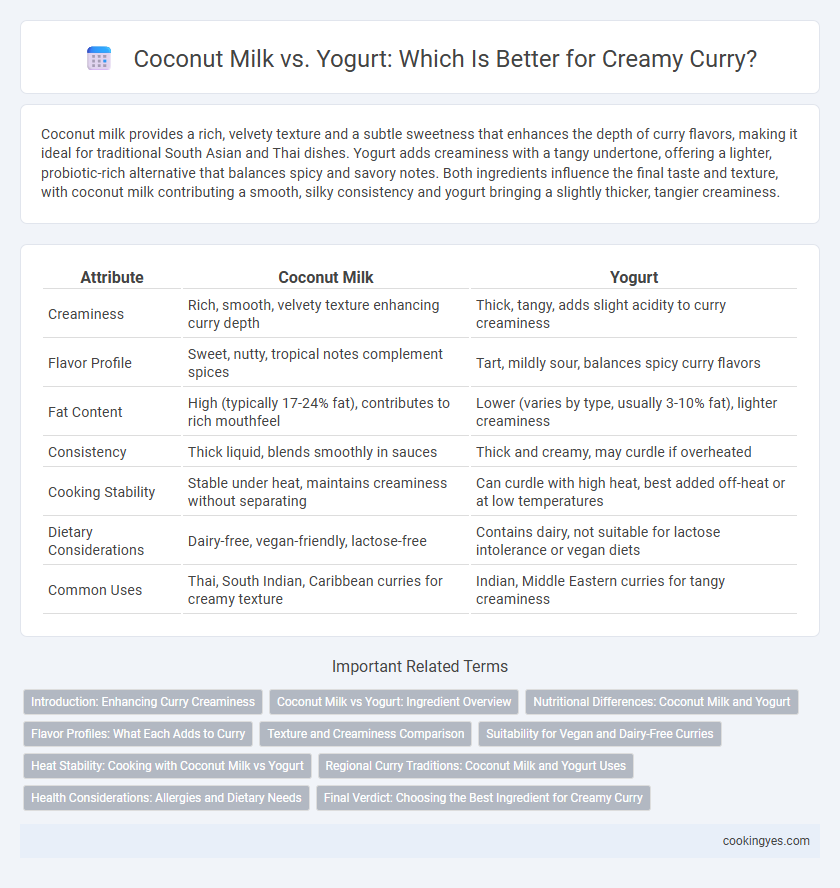Coconut milk provides a rich, velvety texture and a subtle sweetness that enhances the depth of curry flavors, making it ideal for traditional South Asian and Thai dishes. Yogurt adds creaminess with a tangy undertone, offering a lighter, probiotic-rich alternative that balances spicy and savory notes. Both ingredients influence the final taste and texture, with coconut milk contributing a smooth, silky consistency and yogurt bringing a slightly thicker, tangier creaminess.
Table of Comparison
| Attribute | Coconut Milk | Yogurt |
|---|---|---|
| Creaminess | Rich, smooth, velvety texture enhancing curry depth | Thick, tangy, adds slight acidity to curry creaminess |
| Flavor Profile | Sweet, nutty, tropical notes complement spices | Tart, mildly sour, balances spicy curry flavors |
| Fat Content | High (typically 17-24% fat), contributes to rich mouthfeel | Lower (varies by type, usually 3-10% fat), lighter creaminess |
| Consistency | Thick liquid, blends smoothly in sauces | Thick and creamy, may curdle if overheated |
| Cooking Stability | Stable under heat, maintains creaminess without separating | Can curdle with high heat, best added off-heat or at low temperatures |
| Dietary Considerations | Dairy-free, vegan-friendly, lactose-free | Contains dairy, not suitable for lactose intolerance or vegan diets |
| Common Uses | Thai, South Indian, Caribbean curries for creamy texture | Indian, Middle Eastern curries for tangy creaminess |
Introduction: Enhancing Curry Creaminess
Coconut milk and yogurt both enhance curry creaminess by adding rich, smooth textures and balancing spices. Coconut milk imparts a naturally sweet, tropical flavor while maintaining a dairy-free profile, making it ideal for vegan curry recipes. Yogurt contributes a tangy richness and probiotics, enriching the curry's flavor complexity and aiding digestion.
Coconut Milk vs Yogurt: Ingredient Overview
Coconut milk provides rich, natural creaminess to curry with a smooth texture and subtle sweetness, making it ideal for dairy-free and vegan recipes. Yogurt contributes a tangy flavor and thicker consistency, often adding probiotics and a slightly acidic balance to the curry. Both ingredients enhance creaminess but differ in nutritional profiles, with coconut milk offering healthy fats and yogurt delivering protein and live cultures.
Nutritional Differences: Coconut Milk and Yogurt
Coconut milk provides a rich source of healthy saturated fats and medium-chain triglycerides that enhance curry creaminess while offering a dairy-free option suitable for lactose intolerance. Yogurt contains probiotics, calcium, and protein, contributing to gut health and a tangier flavor profile in curries, with lower fat content compared to coconut milk. Choosing between coconut milk and yogurt can influence the nutritional balance of a curry, impacting calorie count, fat composition, and digestive benefits.
Flavor Profiles: What Each Adds to Curry
Coconut milk imparts a rich, naturally sweet flavor with subtle nutty undertones that enhance the tropical and spicy notes of curry, creating a smooth and creamy texture. Yogurt contributes a tangy, slightly acidic taste that brightens the dish while adding a velvety consistency, balancing spicy and savory elements. Choosing between coconut milk and yogurt influences the curry's overall flavor profile, with coconut milk offering a sweeter creaminess and yogurt delivering a refreshing zest.
Texture and Creaminess Comparison
Coconut milk provides a rich, velvety texture with a naturally sweet and creamy consistency that enhances curry's smoothness without curdling. Yogurt adds a tangy flavor and a thinner creaminess, creating a slightly lighter texture but requiring careful temperature control to prevent separation. The choice between coconut milk and yogurt significantly influences the curry's mouthfeel and creaminess profile, catering to different taste preferences and dietary needs.
Suitability for Vegan and Dairy-Free Curries
Coconut milk is ideal for vegan and dairy-free curries due to its rich, creamy texture derived from natural coconut fats, providing a smooth mouthfeel without animal products. Yogurt adds a tangy flavor and creamy consistency but is unsuitable for strict vegan or dairy-free diets because it contains dairy. Choosing coconut milk ensures adherence to vegan and lactose-free dietary requirements while maintaining the desired curry creaminess.
Heat Stability: Cooking with Coconut Milk vs Yogurt
Coconut milk maintains its creaminess and smooth texture under high heat, making it ideal for simmering curries without curdling. Yogurt, especially low-fat varieties, curdles easily when exposed to high temperatures, requiring careful tempering or slow cooking. The fat content in coconut milk contributes to its superior heat stability compared to yogurt in curry preparations.
Regional Curry Traditions: Coconut Milk and Yogurt Uses
Coconut milk is a staple in South Indian and Southeast Asian curry recipes, delivering a rich, naturally sweet creaminess that complements spices like turmeric and curry leaves. Yogurt, favored in North Indian and Pakistani curries, adds a tangy, thick texture that balances heat from chili peppers and garam masala. Each ingredient reflects regional culinary traditions, shaping distinctive flavor profiles and creamy consistencies in their respective curry styles.
Health Considerations: Allergies and Dietary Needs
Coconut milk provides a dairy-free alternative for curry creaminess, making it suitable for individuals with lactose intolerance or milk allergies, while also offering healthy fats like medium-chain triglycerides (MCTs) that support metabolism. Yogurt, rich in probiotics and calcium, benefits gut health and bone strength but may trigger reactions in those with dairy allergies or sensitivities. Choosing between coconut milk and yogurt in curry depends on balancing dietary restrictions, allergy considerations, and nutritional goals.
Final Verdict: Choosing the Best Ingredient for Creamy Curry
Coconut milk provides a rich, naturally sweet creaminess that enhances the tropical flavor profile of many curry dishes, making it ideal for Thai and South Indian curries. Yogurt adds a tangy, slightly acidic creaminess that tenderizes meat and balances spicy heat, commonly used in North Indian curries. The best ingredient depends on the curry style: choose coconut milk for a smooth, velvety texture with subtle sweetness, or opt for yogurt to achieve a thicker, tangy creaminess that complements bold spices.
Coconut milk vs yogurt for curry creaminess Infographic

 cookingyes.com
cookingyes.com